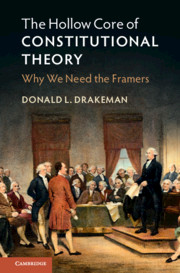Book contents
- The Hollow Core of Constitutional Theory
- The Hollow Core of Constitutional Theory
- Copyright page
- Contents
- Preface
- 1 The Framers and Contemporary Constitutional Theory
- 2 The Framers’ Intentions
- 3 Original Methods and the Limits of Interpretation
- 4 Original Methods Updating
- 5 The Semantic Summing Problem
- 6 Is Corpus Linguistics Better than Flipping a Coin?
- 7 The Framers’ Intentions Can Solve the Semantic Summing Problem
- 8 Interpretation and Sociological Legitimacy
- 9 Noninterpretive Decisions
- 10 Conclusion
- Bibliography
- Index
2 - The Framers’ Intentions
Who, What, and Where
Published online by Cambridge University Press: 26 January 2021
- The Hollow Core of Constitutional Theory
- The Hollow Core of Constitutional Theory
- Copyright page
- Contents
- Preface
- 1 The Framers and Contemporary Constitutional Theory
- 2 The Framers’ Intentions
- 3 Original Methods and the Limits of Interpretation
- 4 Original Methods Updating
- 5 The Semantic Summing Problem
- 6 Is Corpus Linguistics Better than Flipping a Coin?
- 7 The Framers’ Intentions Can Solve the Semantic Summing Problem
- 8 Interpretation and Sociological Legitimacy
- 9 Noninterpretive Decisions
- 10 Conclusion
- Bibliography
- Index
Summary
Identifying the will of the lawmaker has long been the central interpretive inquiry in American jurisprudence, an approach this nation inherited from a very lengthy set of legal predecessors. A great deal of commentary throughout Western legal history has been devoted to the questions of what constitutes the will of the lawmaker, and where interpreters should find evidence of that will, but there has been impressive agreement on the question of whether interpreters should do so. This chapter will address both what and where, but, first, there is a question that is peculiar to the American constitutional setting: who is the lawmaker? This chapter argues that the primary lawmaker is the Framers, and, only secondarily, the ratifiers. Based on work by Richard Ekins and others, it shows that there actually can be an intention of the constitutional lawmakers that is recoverable by interpreters. It also shows that the records of the constitutional debates and drafting can potentially provide essential information for interpreters seeking to determine what policy choice was made by the adoption of the constitutional language – that is, the ends and means represented by the text.
- Type
- Chapter
- Information
- The Hollow Core of Constitutional TheoryWhy We Need the Framers, pp. 26 - 54Publisher: Cambridge University PressPrint publication year: 2021

